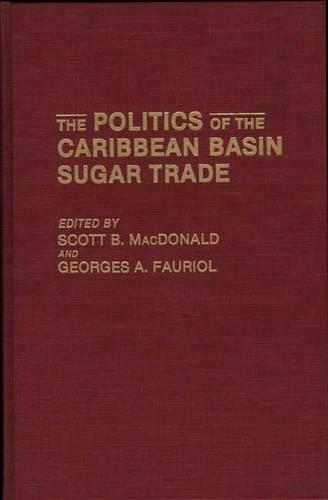
The Politics of the Caribbean Basin Sugar Trade
(Hardback)
Publishing Details
The Politics of the Caribbean Basin Sugar Trade
By (Author) Georges A. Fauriol
By (author) Scott Macdonald
Bloomsbury Publishing PLC
Praeger Publishers Inc
30th June 1991
United States
Classifications
Tertiary Education
Non Fiction
382.4136109729
Physical Properties
Hardback
176
Description
Growing global interdependence made the 1970s and 1980s a volatile period in the sugar trade at a time when Caribbean countries, while not the major world producers of sugar, were economically dependent on their sugar exports. Since then, government farm supports and quotas on imported sugar in the United States, overproduction in developing countries, and the emergence of a highly protected European Community sugar industry have all served to make the sugar trade a highly political global issue. This study focuses on the evolution of the U.S.--Caribbean Basin sugar trade in the 1980s and its impact on political relations between the countries involved. According to the authors, the sugar trade was not driven by laws of supply and demand, but by various political agendas. Economic protectionism, government subsidies for inefficient elements of the sugar industry, as well as corruption and mismanagement have contributed to the Byzantine politics of the sugar trade. Now the United States needs to determine how lifting quotas and terminating subsides will affect this complex relationship. By providing an in-depth look at the development of current policies in the sugar trade, this book offers the necessary background for making informed policy decisions. After examining the U.S. sugar policy from 1974 to 1989, the book provides a broader Latin American perspective of U.S. and European Community sugar policies. It also offers subregional and country analyses covering the Commonwealth Caribbean, Central America, Cuba, the Dominican Republic, Haiti, and Panama. Despite the difficulty of competing against the United States and Europe, Caribbean and Central American countries are likely to continue to depend on sugar cane. Climactic and ecological factors make agricultural diversification extremely difficult. Some Caribbean and Central American producers have considered making ethanol automobile fuel from sugar, but here too they face protectionist pressure from U.S. producers of corn. Given current political realignments, the authors predict that the influence of the United States and the Soviet Union will diminish in the 1990s. The European Community, on the other hand, is likely to have greater influence on the inter-American sugar trade. Students of Latin American politics and international relationships, as well as those involved in the sugar industry or the policies affecting it, will find this book a valuable resource for future decisions.
Reviews
Because of current problems surrounding the General Agreement on Tariffs and Trade (GATT) negotations, this is an especially timely study of an important regional issue--the sugar industry of the Caribbean Basin and the impact of international trade policies of the industrialized nations. Through a series of case studies of both the island economies and Central America, the authors show clearly and convincingly the hypocrisy of the policies of the US and the European nations. These countries push the Caribbean region to foster economic development on the one hand, but at the same time they follow severely protectionist policies to placate vested interests at home. These policies have had a devastating effect on the efforts of the Caribbean region to restructure and develop its economies. A further unfortunate side effect has been the impetus given to the drug industry. The special case of Cuba is also covered, describing the bleak outlook there as the USSR inevitably becomes more self-sufficient in sugar. The work is a valuable sequel to the Internation Bank for Reconstruction and Development (World Bank) study, The Caribbean: Export Preferences and Performances (1988). Useful bibliography. Recommended for all academic Latin American collections.--M.C. Bird, The Colorado College-Choice
"Because of current problems surrounding the General Agreement on Tariffs and Trade (GATT) negotations, this is an especially timely study of an important regional issue--the sugar industry of the Caribbean Basin and the impact of international trade policies of the industrialized nations. Through a series of case studies of both the island economies and Central America, the authors show clearly and convincingly the hypocrisy of the policies of the US and the European nations. These countries push the Caribbean region to foster economic development on the one hand, but at the same time they follow severely protectionist policies to placate vested interests at home. These policies have had a devastating effect on the efforts of the Caribbean region to restructure and develop its economies. A further unfortunate side effect has been the impetus given to the drug industry. The special case of Cuba is also covered, describing the bleak outlook there as the USSR inevitably becomes more self-sufficient in sugar. The work is a valuable sequel to the Internation Bank for Reconstruction and Development (World Bank) study, The Caribbean: Export Preferences and Performances (1988). Useful bibliography. Recommended for all academic Latin American collections.--M.C. Bird, The Colorado College"-Choice
Author Bio
SCOTT B. MacDONALD is an International Economic Advisor at the Office of the Comptroller of the Currency in Washington, D.C. He is the author of Trinidad and Tobago: Democracy and Development in the Caribbean, Dancing on a Volcano: The Latin American Drug Trade and Mountain High, White Avalanche: Cocaine and Power in the American States and Panama (Praeger, 1986, 1988, and 1989, respectively). He has written articles for Times of the Americas, Journal of Inter-American Studies and World Affairs, and SAIS Review. GEORGES A. FAURIOL is Director of Latin American Studies and Coordinator of the Americas Program at the Center for Strategic and International Studies. He is author of Foreign Policy Behavior of Caribbean States: Guyana, Haiti, and Jamaica and co-author of Caribbean Basin Security, The Cuban Revolution: 25 Years Later and Guatemala: The Political Puzzle. He has published numerous articles in such journals as Foreign Affairs.
